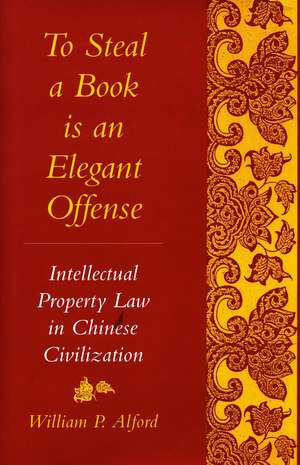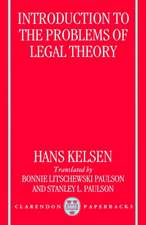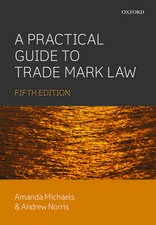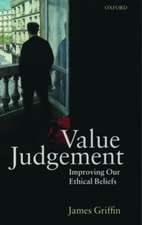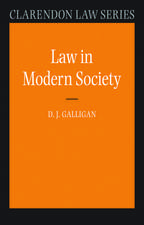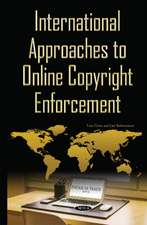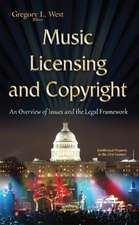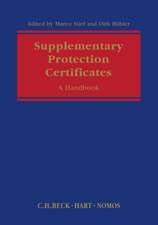To Steal a Book Is an Elegant Offense: Intellectual Property Law in Chinese Civilization
Autor William Alforden Limba Engleză Hardback – 28 feb 1995
This study examines the law of intellectual property in China from imperial times to the present. It draws on history, politics, economics, sociology, and the arts, and on interviews with officials, business people, lawyers, and perpetrators and victims of 'piracy'. The author asks why the Chinese, with their early bounty of scientific and artistic creations, are only now devising legal protection for such endeavors and why such protection is more rhetoric than reality on the Chinese mainland. In the process, he sheds light on the complex relation between law and political culture in China. The book goes on to examine recent efforts in the People's Republic of China to develop intellectual property law, and uses this example to highlight the broader problems with China's program of law reform.
| Toate formatele și edițiile | Preț | Express |
|---|---|---|
| Paperback (1) | 168.14 lei 3-5 săpt. | |
| Stanford University Press – 31 dec 1996 | 168.14 lei 3-5 săpt. | |
| Hardback (1) | 644.44 lei 6-8 săpt. | |
| Stanford University Press – 28 feb 1995 | 644.44 lei 6-8 săpt. |
Preț: 644.44 lei
Preț vechi: 795.60 lei
-19% Nou
Puncte Express: 967
Preț estimativ în valută:
123.31€ • 128.76$ • 101.83£
123.31€ • 128.76$ • 101.83£
Carte tipărită la comandă
Livrare economică 15-29 aprilie
Preluare comenzi: 021 569.72.76
Specificații
ISBN-13: 9780804722704
ISBN-10: 0804722706
Pagini: 236
Dimensiuni: 140 x 216 x 16 mm
Greutate: 0.45 kg
Ediția:1
Editura: Stanford University Press
Colecția Stanford University Press
ISBN-10: 0804722706
Pagini: 236
Dimensiuni: 140 x 216 x 16 mm
Greutate: 0.45 kg
Ediția:1
Editura: Stanford University Press
Colecția Stanford University Press
Recenzii
"This ambitious, pioneering work makes available a wealth of new material. It is presented in a richly textured context of the forces—historical, cultural, and political—that have shaped China's approach to the drafting and enforcement of legislation relating to copyrights, patents, and trademarks. Scholars of Chinese law and comparative law and specialists in the law of intellectual property will welcome its publication."—R. Randle Edwards, Columbia University School of Law
"Alford offers a rich mine of materials for those studying intellectual property rights in China. Reviewing Chinese civilization from imperial days to the present, he seeks to answer why intellectual property law has never taken hold in China."—Choice
"A wealth of information and analysis on Chinese views of intellectual property rights. . . . The strength of Alford's book is its ability to step back from the heated debates surrounding China's actions and look at the subject in its entirety. The reader is thus able to gain a deeper understanding of the issue and the obstacles that both China and the United States must overcome if a longlasting and mutually beneficial solution is to be found."—The China Business Review
"In this timely and important study, . . . Alford's point is that intellectual property issues are inextricable from broad historical, political, economic, and cultural contexts. . . . Of much broader interest than may be at first apparent."—Business History Review
Textul de pe ultima copertă
“This ambitious, pioneering work makes available a wealth of new material. It is presented in a richly textured context of the forces—historical, cultural, and political—that have shaped China’s approach to the drafting and enforcement of legislation relating to copyrights, patents, and trademarks. Scholars of Chinese law and comparative law and specialists in the law of intellectual property will welcome its publication.”—R. Randle Edwards, Columbia University School of Law
“Alford offers a rich mine of materials for those studying intellectual property rights in China. Reviewing Chinese civilization from imperial days to the present, he seeks to answer why intellectual property law has never taken hold in China.”—Choice
“Alford offers a rich mine of materials for those studying intellectual property rights in China. Reviewing Chinese civilization from imperial days to the present, he seeks to answer why intellectual property law has never taken hold in China.”—Choice
Descriere
This sweeping study examines the law of intellectual property in Chinese civilization from imperial days to the present. It uses materials drawn from law, the arts and other fields as well as extensive interviews with Chinese and foreign officials, business people, lawyers, and perpetrators and victims of "piracy."
